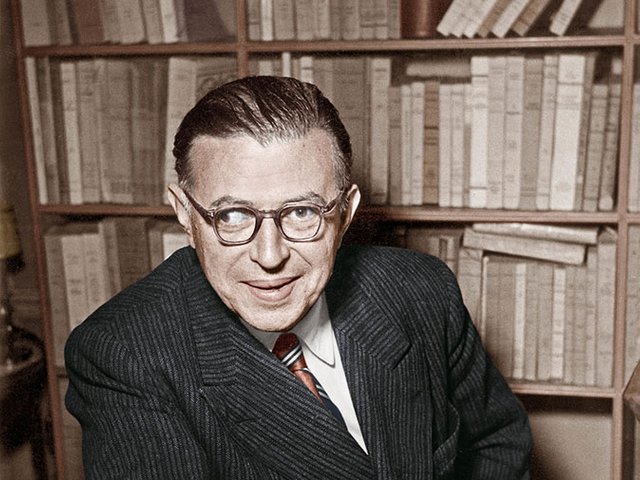Jean-Paul Sartre trough the eyes of André Maurois

Like Stefan Zweig, his Austrian writer by fate, Andre Maurois has created a world name above all as a master of romanized biographies and of insightful essayism. Lived from 1885 to 1957, Maurois remained in the minds of readers as the author of fascinating books about Shelley, Byron, Turgenev, Hugo, Dumas, Balzac. With exquisite style and psychological depth, Maurois painted portraits of great artists from his beloved century of Romanticism. But at the very end of his life, he turned to his unromantic time and created the vast series of essays "French writers of the XX century". The book ends with a portrait of Jean-Paul Sartre.
Maurois does not hide his skeptical and even ironic attitude towards this writer, who is completely alien to him in a world-wide and lifelike position. In the period 1942-1946, the author of "Climates" notes that the Sartre phenomenon is the great event in literary history. During and after the war, Sartre won the broad circle of readership with his theater and also with his philosophy. They call him the leader of existentialism, a school that has become a program of behavior and thinking for a large part of the French youth. Sartre manages to portray into his dramatic heroes complex philosophical ideas that would otherwise remain inaccessible to the audience. These ideas meet the demands of the young intelligentsia, confused by the war, worried by the absurdity of the world, discouraged by bourgeois hypocrisy. This is how a legend is born that artificially links existentialism with the nightlife in Saint-Germain-de-Pré. It helps to spread the works of Sartre through the notion of a carefree life. And because Sartre also possesses remarkable intelligence, bright dramatic talent and rare dialectical power, his success is lasting, emphasizes André Moore.

According to Maurois, these words hide the supreme coquetry, for Sartre knows very well what he will do with his life: he will tell it and show that his childhood has its morality - that is, the gross negation of the hypocrisy and the bad faith of the "immovable people." Because in his youth Sartre had observed this bad faith in his own and himself, so he fought so angrily later against that, concludes Maurois. Before becoming a writer, Sartre is now a philosopher. He has always believed that each age remains a single philosophy - one that expresses the basic direction of society. This is also the case with French existentialism in the mid-twentieth century. It is a philosophy of freedom that puts human will at the center of everything. "Man is condemned to be free." "Sartre wrote. While others shape us, we accept their values. From the moment we begin to create our own values, we become fully responsible. "Once freedom lights its beacon in man's heart, the gods are powerless against him" Sartre continues, summarizing that he choose his very essence, and since he can not choose his destiny,he choose his way of life."
This philosophy raised a lot of noise, says Maurois , exerting some influence. But, in general, it was poorly understood. For the mobs this was philosophy for long-haired boys and girls. But a whole group of French writers (and above all Sartre and Simon de Bovario) carried this philosophy into novels and dramas, gave them weight and resonance, while novels and dramas respectively gave existionalism a power with which it impacts on modern minds. Andre Maurois completes his observations with the finding that the important thing in Sartre's work is the transition from negative to positive behavior. This transition begins after the end of the war and is expressed by the words: "Denying does not mean NOT, but to transform through work. We should not think that the revolutionary entirely deny capitalist society - how could he deny it when and he himself is inside him, on the contrary, he accepts it as a fact that justifies his revolutionary action: "Change the world!" Marx says, "Good luck, change it if you can." That means you will accept a lot things to change some. " In Francis Janson's book "Sartre for himself," Maurois discovers a statement by the leader of existentialism, which seems to him to be not so existentialist. Here is Sartre's words: "I think there is always something to be done in all cases." In one article, critic Robert Canter writes: "When Mr. Sartre looks at his brightest minds, does he see more than a mirror game in which his mind seeks to lose his image?" And Maurois - together with Canter - says that there should be no hopelessness here. Rather bold insight. Words are not everything, but when they are well-chosen, they save the word master.
To listen to the audio version of this article click on the play image.

Brought to you by @tts. If you find it useful please consider upvote this reply.
okey :)
As usual great quality on your post @godflesh. I was wondering...do you have in your vast literary arsenal something about Albert Camus, so I could read it? He's more familiar for me (The Myth of Sisyphus+The Stranger), than Sartre.
Cheers!
Thank you :) For me It is hard to say who I prefer more....
And yes I have... You can read this: https://steemit.com/philosophy/@godflesh/the-rebellious-man-of-albert-camus
and this: https://steemit.com/philosophy/@godflesh/the-absurd-albert-camus-and-zen
Have a nice day! :)
Thanks, you too!
Wow.. awesome story, good text, excellent and organized.
Thank you
You got a 9.32% upvote from @postpromoter courtesy of @godflesh!
Want to promote your posts too? Check out the Steem Bot Tracker website for more info. If you would like to support the development of @postpromoter and the bot tracker please vote for @yabapmatt for witness!